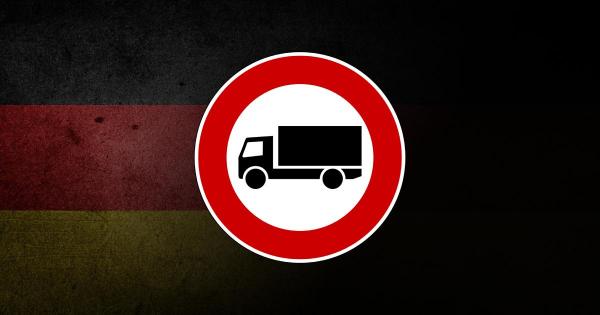
Germany: night traffic restrictions on the A7
Due to the reconstruction of the A7 motorway near Hamburg, traffic at night will be restricted on the section between the junctions Bahrenfeld (28) and Volkspark (27).
From 9:00 PM on Thursday (15.06) to 5:00 AM on Friday (16.06):
• northbound traffic (in the direction of Flensburg) will continue along one lane;
• drivers are obliged to follow the diversion route U 31 to Volkspark junction (27)
Drivers can also use the junctions at Stellingen (26) and Othmarschen (29), where traffic continues in both directions!

A2 closure at Whitfield for bridge installation
Where possible, traffic heading to or from the Port of Dover is recommended to use the A20/M20.
A key milestone in construction of Fastrack takes place on the weekend of Friday 14 to Monday 17 July as a new 31.5m span bridge is installed across the A2 at Whitfield.
A short stretch of the A2 from the Whitfield roundabout to the Whitfield interchange (A256 junction) will be closed to all traffic from 9.00pm on Friday, 14 July to 5.00am on Monday, 17 July.
There will be a signed diversion via the White Cliffs Business Park (Honeywood Road and Honeywood Parkway) during the works to install the bridge. Where possible, traffic heading to or from the Port of Dover is recommended to use the A20/M20.
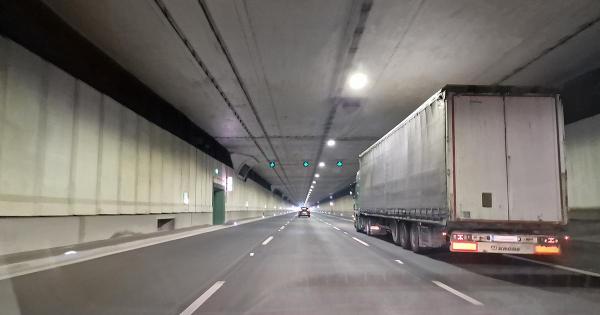
Closures of the Mont Blanc Tunnel in June and July
Since June 14, traffic in the Mont Blanc tunnel will be temporarily affected by complete closures associated with renovation works on two 300-meter sections of the tunnel.
June
• 14 June 11:30 PM to 16 June 06:00 AM (30 hrs 30 mins),
• 19/20 June, from 7:30 PM-06:00 AM (10 hrs 30 mins),
• 20/ 21 June, from 7:30 PM-06:00 AM (10 hrs 30 mins),
• 21/ 22 June, from 7:30 PM-06:00 AM (10 hrs 30 mins),
• 22/23 June, from 7:30 PM-06:00 AM (10 hrs 30 mins),
• 26/27 June, from 7:00 PM-06:00 AM (11 hrs),
• 28/ 29 June, from 22:00 PM to 06:00 AM (8 hrs);
• 29/30 June, from 22:00 PM to 06:00 AM (8 hrs).
July
• 3/4 July, from 10:00 PM to 6:00 AM (8 hrs)
• 4/5 July, from 10:00 PM to 6:00 AM (8 hrs)
• 5/6 July, from 10:00 PM to 6:00 AM (8 hrs)
• 6/7 July, from 10:00 PM to 6:00 AM (8 hrs)
There will be 15 weeks of disruptions in the tunnel from August 4 to December 18.
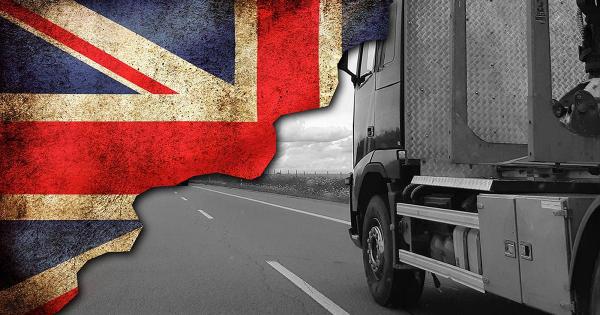
Operation Brock contraflow is back
The Operation Brock contraflow system on the M20 in Kent will be deployed from Friday 14 July ahead of the summer holidays and expected high passenger numbers.
Operation Brock is part of a series of measures to improve Kent’s resilience and ensure the smooth flow of traffic through the region in the event of disruption to services across the English Channel.
To ensure safe deployment of the contraflow system, the M20 will be closed as follows:
• 9pm Tuesday 11 July to 6am Wednesday 12 July: Coast bound carriageway between junction 9 and junction 8
• 8pm Thursday 13 July to 6am Friday 14 July: London bound carriageway between junction 9 and junction 8, coast bound carriageway between junction 7 and junction 9
Fully signed diversion routes will be place while the M20 is closed overnight. These times have been chosen to minimise disruption to road users. When the M20 reopens at 6am on Friday 14 July, the Operation Brock contraflow will be in place and all signs and signals should be followed.
Once the barrier is in place, all HGVs heading for the Port of Dover or Eurotunnel must follow the signs to join Operation Brock at M20 junction 8.
Any EU-bound HGVs not complying with signage and trying to use another route to Eurotunnel or the Port of Dover risk a fine of £300. They will also be sent to the back of the queue by Police or enforcement agents, wasting time, fuel, and money. This includes trying to bypass the M20 by using the M2/A2 at Brenley Corner. All other coast bound traffic – including local freight and car drivers heading for the continent – should follow the signs and cross over to enter the contraflow on the M20 London bound carriageway.
Anyone planning to use Eurotunnel and the Port of Dover are advised to plan their journeys and check with the travel operator before setting out. They should also allow more time for their journeys and make sure they are prepared for delays, so should have plenty of fuel, warm clothes, and supplies such as food and drink. The contraflow is expected to be in place for two weeks.
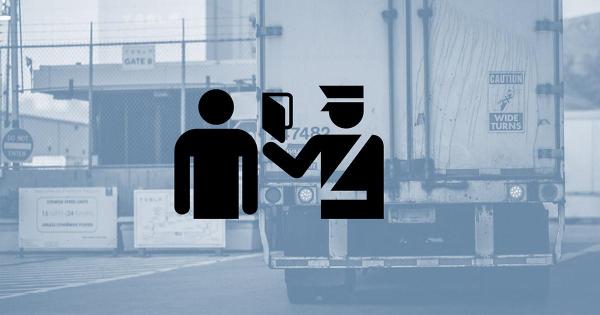
Lithuania reintroduces border controls with Poland and Latvia
The measure is connected with the NATO summit held in Vilnius from 11 to 12 July. Border checks start today, July 7, and will continue until July.
When crossing the internal border, travellers should carry with them:
a) personal travel documents:
• identity cards or passports (citizens of EU countries),
• passports and visas (non-EU nationals) if they are obliged to have a visa (or other documents enabling them to enter the territory of Schengen countries, such as temporary or permanent residence permits)
b) documents of the vehicle.
Because of internal border controls, journeys could potentially take longer, but travellers should not experience any major inconveniences as a result.
Border controls will also be introduced at airports for passengers of flights between countries of the Schengen area and at border crossings in seaports as well as for people crossing the land border with Poland and Latvia. Depending on the situation and potential threats, border checks will be conducted selectively based on a risk analysis at any time of the day. Temporary infrastructure will be used, including road signs and barriers to regulate traffic.

Polish lorries banned from passing through Russia
The ban, announced by the Russian Ministry of Transport, will be in effect until the end of 2023.
The ban applies to transports of goods performed by companies from hostile countries, including Poland. The Russian government has introduced exceptions that apply to transports of essential goods, including medicines and medical equipment. There is also an exception for transports of essential goods to Königsberg (Kaliningrad).

Germany: changes in the HGV ban during the holiday season
Given recent changes in traffic volumes and the condition of some motorways and federal roads, the Federal Council has adopted the 13th amendment to the holiday travel ordinance.
The regulation introduces a driving ban for all vehicles with a GVW of more than 7.5 tons, used for commercial transport of goods, including empty runs, that applies on Saturdays from July 1 to August 31 between 7:00 AM and 8:00 PM., on selected sections of motorways and federal roads. The purpose of the ban is to make it easier for holiday travellers to reach their vacation destinations during the two months of the holiday season.
❗ To keep up with changing traffic volumes and the infrastructural development of the network of motorways and federal roads, the list of sections affected by the ban has been extended.
Justification
⭕ The A 4 motorway is the most important connecting route for holiday travel between south-west Germany or the Rhine-Main area and east Germany. In the area between the Kirchheim triangle and the Thuringia state border near Herleshausen, the motorway consists of four lanes. Up to 40,000 motor vehicles drive along the motorway every 24 hours, with HGV traffic accounting for 20-25 per cenr. There are sections with gradients of well over 4% (sometimes up to 6.5%). During the holiday season, the traffic volume can increase by 20-40 per cent. In addition, large parts of the route do not have a hard shoulder. Finally, as a result of expansion works, which are due to continue for several more years, there are frequent tailbacks with traffic moving at speeds below 60 kph, especially in the summer months.
⭕ The 5 motrway between the Homberg junction (Ohm) and Hattenbacher triangle has only four lanes. It is the most important connecting route for holiday travel between south-west Germany and the Rhine-Main area and north and east Germany. Well over 50,000 motor vehicles travel along the motorway every 24 hours and HGV traffic accounts for 18.5-20%. The motorway includes sections with a gradients of over 4-7%. During the holiday season, traffic valume on Saturdays can rise by 30-50 percent. The A 5 section from the Homberg junction (Ohm) to Bad Homburger Kreuz interchange is already listed in the Holiday Travel Ordinance. The new section has been added to close existing gaps. During the holiday seasons, there are frequent tailbacks with traffic moving at speeds below 60 kph. Lorries can use alternative routes along B49 and B62.
⭕ Once the expansion of the A 10 (including A 24) is complete, it is expected that the section of the A 10 from the Kreuz Oranienburg via the Pankow triangle to the Barnim triangle will have sufficient capacity to accommodate holiday traffic, as well as HGV traffic (especially vehicles with a GVW of more than 7, 5 tons) without bottlenecks. However, as a result of a significant number of commercial settlements around the motorway, it is necessary to relieve the increased traffic volume in the subordinate road network, particularly associated with commercial vehicles passing residential areas.

Hungary introduces night-time exemptions from the HGV driving ban during the Pentacost weekend
The Hungarian Ministry of Transport has approved night-time breaks in the driving ban for vehicles with a GVW above 7.5t during the Pentecost weekend.
Consequently, HGVs will be allowed to drive:
• from 10:00 PM on Saturday, May 27 to 6:00 AM on Sunday, May 28;
• from 10:00 PM on Sunday, May 28, to 6:00 AM on Monday, May 29.
The driving ban will apply as follows:
• on May 28 (Pentecost Sunday) from 06:00 AM to 10:00 PM;
• on May 29 (Whit Monday) from 06:00 AM to 10:00 PM.
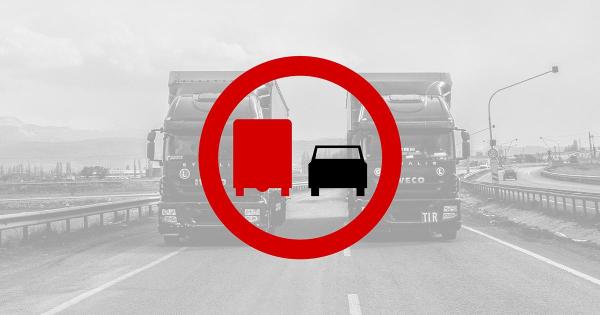
Poland: an overtaking ban for lorries on motorways and expressways
From July 1, heavy goods vehicles are no longer allowed to overtake other vehicles on motorways and expressways. Such manoeuvres are considered to be particularly dangerous to other vehicles traveling at high speeds.
According to amended regulations, category N2 or N3 vehicles or combinations of vehicles with a length of over 7 m, when travelling on a motorway or express road with three or more lanes in one direction, are obliged to use only two lanes closest to the right edge of the carriageway. In addition, category N2 or N3 vehicles are prohibited from overtaking other motor vehicles on a motorway and expressway with only two lanes in one direction of traffic, unless such vehicles are moving at a speed significantly lower than the speed limit for category N2 or N3 vehicles on a given road. This prohibition does not apply to situations when it is necessary to overtake vehicles carrying out cleaning, repair or modernization works, which use amber lights.

Flooding and impassable roads in northern Italy
Because of heavy rains that have hit the central part of northern Italy, many roads are impassable and closed.
The list of affected areas includes the provinces of Bologna, Ferrara, Forlì-Cesena, Modena, Parma, Piacenza, Ravenna, Reggio Emilia and Rimini, where 20 rivers have overflowed. Restrictions for vehicles with a GVW of over 7.5 have been introduced on several road sections, e.g. on the A14 motorway in near San Marino and Rimini. Drivers need to watch out for fallen trees and muddy roads. Lorry drivers are also advised not to drive along flooded road sections, because sanding water seeps into the asphalt and into the foundation, causing the surface to easily crack under the weight of HGVs.
A free interactive map showing the current situation on the roads can be very helpful for haulage companies operating in Italy.